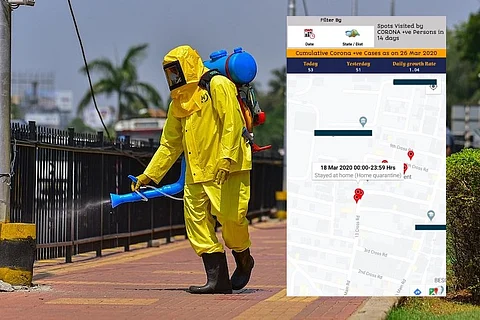

The Karnataka government first faced criticism for publishing the details of those under home quarantine in the state. Now, the government has gone one step further and has published the addresses of those who have tested positive for coronavirus in the state. The government has published the home addresses of those who have tested positive for coronavirus, in a mobile app that is available for public download.
The app is technically meant for people to see if they’ve been around a COVID-19 patient in public spaces – however, the design and data in the app do something else entirely.
The app (TNM is not linking app in the story) shows COVID-19 patients’ travel history, the spots they visited, and the exact time that they were at the spot – which is all useful information if you want to check if you’ve visited the same public place as a positive person, and want to get tested for your symptoms. The app also shows nearby medical facilities like hospitals, sample collection centres and testing labs. However, the government has inexplicably also revealed people’s home addresses in the app.
On the app, by selecting the option ‘spots visited by corona patients,’ a blue dot shows your location while red markers show where all the patients have visited. On zooming in and clicking on one of the markers, a small pop up shows the date, the time and the details of the particular location that the patient has visited. In all cases, the home address is shown and the map even says at instances, 'Met 17-year-old daughter and 38-year-old wife at home'. It also gives the patient's office address and names of relatives they visited in some cases.
The government’s aim is to spread awareness about the location of COVID-19 patients and to ask citizens to self-report if they were present in that location at the time the patient was there. The government has defended putting out the details, stating that they have not mentioned the name of the patient anywhere and ‘personal details’ of the patient have been withheld. However, coupled with the list of quarantined patients, this app has triggered massive concerns about privacy and ostracisation of those who have been quarantined or are battling coronavirus.
Kiran Jonnalagadda, the co-founder of Internet Freedom Foundation and a digital rights activist, says that publishing such details is a massive privacy violation that will only cause unnecessary panic, especially at a time when the police and authorities are coming down heavily on those seen stepping out of their homes.
“It is a serious privacy concern, it now opens people to be harassed by their neighbours, and we have seen the kind of harassment faced by patients and those who have been quarantined across the country. The second concern is that the data does not seem to be accurate. This may lead to completely innocent people being harassed because they have been accidentally marked in the data,” Kiran told TNM.
Moreover, since officials of the Karnataka health officials say that they have been in touch with residents and apartment associations already, the need for home addresses on the app has been further questioned.
“What is the necessity of this information? How is someone's private address of public interest? I can understand if there was no lockdown and they wanted to contain a portion of Bengaluru, but there is no necessity of this app,” Suhrith Parthasarathy, a lawyer based in Chennai, told TNM.
Earlier, many users took to Twitter to state that even though they voluntarily decided to isolate themselves, they were added to the Karnataka government’s watchlist of those in quarantine. One such user explained that this led to many of his neighbours panicking and they “created a ruckus thanks to false rumours spread over a WhatsApp group.”
What a complete mess, paranoid neighbours at my passport address created a ruckus thanks to false rumours spread over a whatsapp group. I am not even self quarantined there - I don't know who to blame more, the authorities who made the details public incorrectly or the herd. FFS.
— Swaroop Hegde (@SwaroopH) March 25, 2020
Speaking to TNM, Justice Srikrishna, who helped draft India’s Data Protection Bill, had pointed out that even under the privacy law, there are exceptions for extraordinary circumstances where the government can invoke public safety to make details like this public.